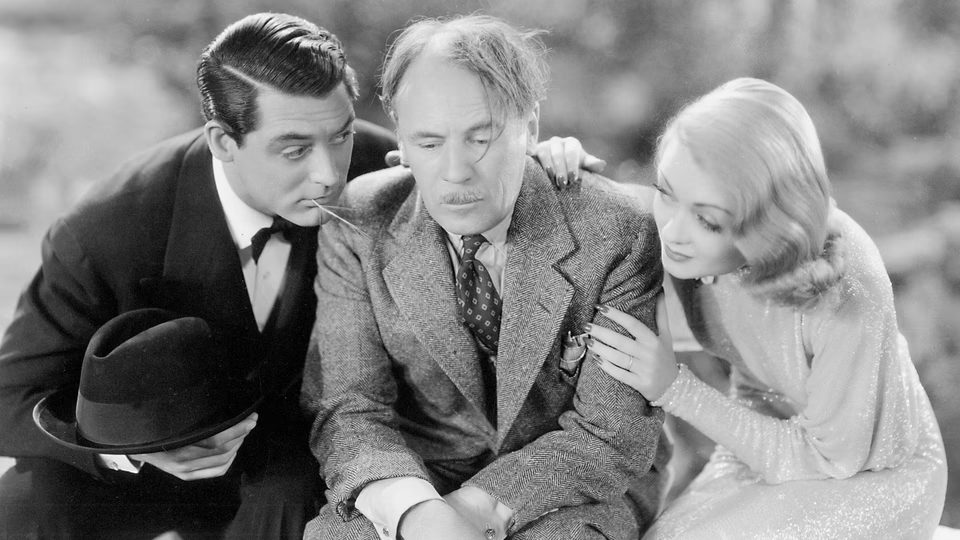Topper

Constance Bennett and Cary Grant play a carefree couple who die in a car crash but, before ascending to the afterlife, must help mousy banker Cosmo Topper, played by Roland Young, learn to live.
The opening scene has Grant and Bennett driving into New York City in their convertible roadster. Grant’s sitting on the trunk, his legs over the seat, driving with his feet. The pair chat in shorthand, evoking the easy familiarity of William Powell and Myrna Loy’s Thin Man chemistry.
They spend the night boozing their way from nightclub to nightclub, ending up in a saloon singing tunes with Hoagy Carmichael on the piano. As dawn breaks, they emerge and drive to the National Security Bank Bank. They park in front of the imposing building and go to sleep.
Next, we meet the bank president, Cosmo Topper. He shuffles through his regimented morning schedule, the family butler telling him when to shower, shave, eat and leave for work. Even the breakfast menu is preset. Cosmo argues with the butler but proves reluctant to confront the household boss, his wife. Instead, Cosmo heads to work where he chairs the annual shareholder meeting.
Outside, a crowd of spectators pointing and laughing wakes Grant, who hurries inside the bank to attend the meeting. Despite holding the largest number of shares, he doodles and ignores the proceedings, while Bennet naps in Cosmo’s office. Frustrated, Cosmo rips into Grant, who tries to charm his way out of the situation. Cosmo has none of it, and Bennett takes Cosmo’s side, further irking Grant.
Bennett and Grant take off in their roadster, heading back to their country estate. They speed around a corner and run off the road, flipping the car. The pair struggle to their feet only to realize they’re now semi transparent. Sitting down on a tree trunk, they accept their fate with a refreshing calm. But instead of ascending up or sinking down, they just fade into invisibility.
Fast forward and Cosmo, still grieving the loss of Grant and Bennett, has purchased and restored their roadster. He takes it out for a spin and runs off the road on the same turn that ended Grant and Bennett, though he only suffers a flat tire. Rattled, he stumbles out of the car and sits down on a nearby fallen tree. Grant’s disembodied voice asks in an annoyed tone that Cosmo please, “Get off my lap.”
Startled, Cosmo leaps to his feet as the film gets down to business, putting him through a series of madcap situations courtesy of Bennett and Grant. She lays down the rules early, saying the pair only have “a limited amount of ectoplasm” per day they can use to maintain a corporeal form. Thus, they spend much of the film invisible. These ghost special effects charm and compensate for the opening’s obvious rear-projection shots.
There’s much to recommend, starting with the script. The opening sequence with Grant steering with his feet conveys volumes about the couple’s devil-may-care attitude, as does the contrast between their carefree night and Cosmo’s dictatorial morning. The few moments the script resorts to telling instead of showing prove succinct, such as when Bennet explains the rules surrounding their ectoplasm.
And speaking of Bennett, I loved how much agency the script affords her character. It’s her idea to help Cosmo, and she takes the lead. Grant treats her as an equal throughout, and the later scenes where he grows jealous feel born of hurt versus entitlement.
As Cosmo, Roland Young also charms. A tricky role, as we have to sympathize with his character’s plight without being put off by his mousy nature. The script helps, giving Young relatable flaws to round out his humanity, such as when he glances at Bennett’s knees when she props her legs up on his desk. A weakness Bennett acknowledges with a verbal grin. Young’s performance conveys his blush despite the black and white photography.
Indeed, there’s a subversive undercurrent throughout Topper that I enjoyed. From the matter-of-fact way Grant and Bennett accept death, to Cosmo’s comments about never beating his wife, the film acknowledges the material’s inherit darker edges even as it skirts them. This black humor balances the overt screwball antics to terrific effect.